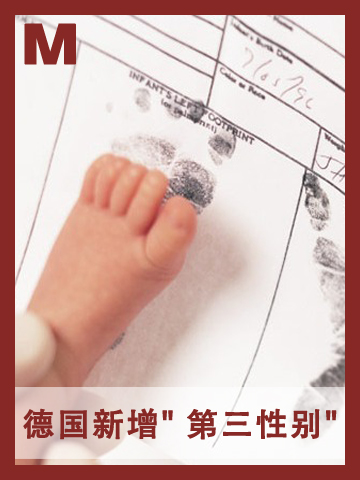从今年11月开始,德国人的出生证上除了标准的“男性”或“女性”选项外,还增加了“空白”选项。该修改法案允许家长选择不确定自己宝宝的性别,允许那些出生时具有两性特征的孩子选择在以后的生活中成为男性还是女性。根据此项新法,个人也可以选择保留两性以外的“空白”选项。
德国是欧洲第一个推出此选项的国家。慕尼黑的《南德意志报》称这个变化为“法律革命”。但是,这个变化对其他个人文件——如护照,仍需人们在“F”(女性)和“M”(男性)之间选择——的性别分配会产生什么影响尚不明确。德国家庭法律刊物《FamRZ》呼吁引入第三类别,指定为字母“X”。
The option of selecting “blank”, in addition to the standard choices of “male or female” on birth certificates will become available in Germany from November 1. The legislative change allows parents to opt out of determining their baby's gender, thereby allowing those born with characteristics of both sexes to choose whether to become male or female in later life. Under the new law, individuals can also opt to remain outside the gender binary altogether.
Germany is the first country in Europe to introduce this option -- Munich-based newspaper Süddeutsche Zeitung is referring to the change as a “legal revolution”. It remains unclear, however, how the change will affect gender assignment in other personal documents, such as passports, which still require people to choose between two categories -- “F” for female and “M” for male. German family law publication FamRZ has called for the introduction of a third category, designated by the letter “X”.
澳大利亚是世界上第一个提出有关性别识别法律准则的国家。根据澳大利亚的分类原则,无论是否经历过变性手术或激素疗法,个人都可以选择第三分类,此法适用于所有个人文件。
6个星期后,FamRZ发表文章,开始报道德国的修改法案。据ILGA Europe——国际女同性恋、男同性恋、双性恋、变性人和阴阳人者协会欧洲分会——政策主任西尔万•阿希乌斯说,欧盟在这个问题上行动落后。虽然布鲁塞尔2010年委托撰写有关少数变性人和阴阳人的报告,而且努力协调禁止性别歧视的工作,但是一直没有取得进展。
- 德国新增“第三性别”
- 英大学生注册表公开调查学生性取向
- M, F or Blank: “Third Gender” Official in Germany from November
- College Registration Paperwork Inquiring Students’ Sex Orientation
- 书评 写书评
- 笔记
-
书评加载中...























 京公网安备 11010802032529号
京公网安备 11010802032529号
笔记加载中...